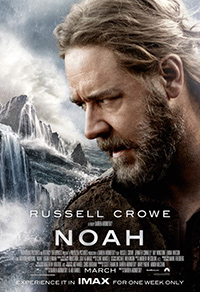Wrath of a Titan: D’aronofsky’s Demilled Egg
 Four years after his critically lauded Black Swan, a work of finesse made despite budgetary limitations from Darren Aronofosky, the director is back with grand Biblical epic, Noah. However, if any disclaimer is necessary concerning its loose inspiration from Christian mythology, it’s that the ambitious venture is colossally silly and unerringly stale. True, the film looks fantastic, employing dazzling visuals as it unveils the inevitable doom of the sinning descendants of murderous Cain, but as rankling as Aronofsky and screenwriter Ari Handel’s liberties may be to the Religious Right, the shackled narrative is as nonsensical as the source, a morale fable concerning a disapproving Creator’s overcomplicated punishment scheme that repositions the human race as a species re-populated exclusively via rampant incest.
Four years after his critically lauded Black Swan, a work of finesse made despite budgetary limitations from Darren Aronofosky, the director is back with grand Biblical epic, Noah. However, if any disclaimer is necessary concerning its loose inspiration from Christian mythology, it’s that the ambitious venture is colossally silly and unerringly stale. True, the film looks fantastic, employing dazzling visuals as it unveils the inevitable doom of the sinning descendants of murderous Cain, but as rankling as Aronofsky and screenwriter Ari Handel’s liberties may be to the Religious Right, the shackled narrative is as nonsensical as the source, a morale fable concerning a disapproving Creator’s overcomplicated punishment scheme that repositions the human race as a species re-populated exclusively via rampant incest.
Trotting scantily through Genesis with a series of images that are repeated throughout Noah’s nightmares, we get the lowdown on how Adam and Eve’s descendants have brought us to the current sad state of affairs. Only the children of their son Seth led a righteous existence, and we’re now down to Noah (Russell Crowe), grandson of Methuselah (Anthony Hopkins), who lives out in a frayed terrain with wife Naameh (Jennifer Connelly) and sons Shem, Ham, and Japheth (all who will eventually be played by Douglas Booth, Logan Lerman, and Leo McHugh Carroll by the time the ark is ready to launch). The Creator reaches out to Noah via his dreams to communicate that mankind, due to his overtly sinful ways, will be wiped out via flood, and not the fire that Noah’s ancestors prophesized (it’s explained that fire consumes all while water cleanses, the good, i.e. virtuous, floating to the top).
With the help of the hulking rock hewn creatures called The Watchers, (which are glowing fairy/angel creatures that disobeyed the Creator when they descended from the heavens to help out Adam and Eve and are thus encrusted in their current form as punishment), Noah and his family, which also includes a stray female child, Ila (Emma Watson) via adoption, construct the ark. As the animals march two by two instinctually (put to sleep by incense Noah burns in the ark), minor drama ensues at the appearance of vicious leader Tubal-cain (Ray Winston), who deigns to kill Noah and take the ark.
Working adamantly against the film’s success is the weight of its source material and a culture’s ingrained familiarity irrevocably (for now) intertwined with it. Growling rock creatures aside (voiced by the gruffness of Nick Nolte, Frank Langella, and Mark Margolis), Aronofsky hardly aims to dispel religious origins or critique them, rather positioning the great Creator (never revered to as god, which would seem to remove it a titch from a monotheistic interpretation) as an angry eco-terrorist.
While the cast may ably be on point with their performances (even a jovial Hopkins as the oldest man alive doesn’t seem untoward), they look distractingly unrealistic. In particular, the stunning Jennifer Connelly and impish Emma Watson and their pearly, straight white teeth seem like modern, fetishized composites of B.C. femininity.
An appropriately hellish sequence where Noah wanders through a fallen populace to finds wives for his two younger sons is effectively chilling, a lamb tossed over a fence and torn stem to stern by the hands of its uncivilized denizens. But then, this is soon followed by unintentional comedy when Methuselah pops a berry in his mouth just as geysers spurt from the earth to overtake it, playing like some ornate chewing gum commercial. One only wishes for more visual flourishes such as the repetitive nightmare montage Noah keeps experiencing, but the visually impressive film, featuring Aronofsky’s regular DP Matthew Libatique, is most notable for rarely distracting us away from the narrative despite its feats.
But by the time we get to the Drowned World tour and Noah learns of the once barren Ila’s baby bump (he had assumed his youngest son would be the last descendent, as it was the Creator’s wish for man to die out), the epic begins to feel stagnant, indeed. As Tubal-cain secretly hides in the bowels of the ark with rebellious son Ham’s help (he’s pissed that dad neglected to snag him a wife of his own), biting off the heads of sleeping animals whenever he sees fit, Noah turns into a crazed madman, vowing to kill his grandchild if it happens to be female, causing events to converge simultaneously, transpiring as cheap melodrama.
It’s clear that Noah isn’t designed for a religious audience, instead playing as a parable about self-righteousness and the consequences of selfish choices humans make, even as they have the foresight to know better. And besides being a rare example of an auteur granted unprecedented access to a passion project with studio backing, Noah also bears the battle scars of collaboration bent on commercial success, a mottled endeavor that’s certainly a head above the onslaught of Marvel superheroes we’re revisited with annually, but also serves as the least satisfactory of Aronofksy’s impressive filmography.
★★/☆☆☆☆☆


